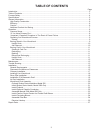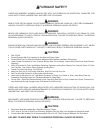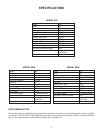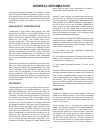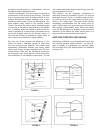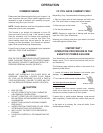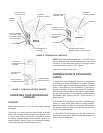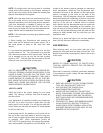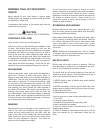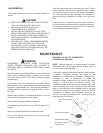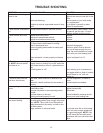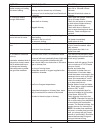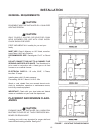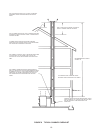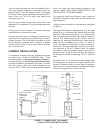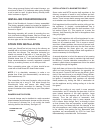
11
BURNING COAL IN YOUR WOOD
-
CHUCK
Never attempt to burn coal without a shaker grate.
Shaker grates are standard on Models 2900 and 4000
but optional on Model 526.
A barometric draft control in the smoke pipe must be
used when burning coal.
CAUTION:
UNSAFE TO LOAD COAL ABOVE TOP OF FIRE BRICK.
STARTING A COAL FIRE
Open all draft controls on your Woodchuck.
Build a fire using dry wood kindling and establish a bed
of coals. Add several small shovels of coal over the
wood coals. After the coal fire is established and spread
throughout the firebox, add larger amounts of coal to
build up the coal bed. Gently shake the grate until live
coals fall into the ash pan area. Allow your Woodchuck
to operate with drafts open for approximately 15 minutes
or until fresh coal ignites. When the coal is properly ig-
nited, adjust the drafts accordingly. Check the fire peri-
odically to be sure it is spreading through the coal bed.
RECHARGING
Gently shake grates down. Open drafts and establish a
good flow of primary air below the grates. When re-
charging, fresh coal tends to give off large quantities of
volatile gas. This gas may accumulate and possibly ig
-
nite causing a backpuff. To reduce back-puffing, open
the fire door to the first safety latch position for 15-20
seconds before opening fully. Spread fresh coal evenly
over existing coal, leaving some hot coals exposed in
the center of the firebox. Be careful not to smother your
existing coals. Never allow coal to build up above the
top of the firebrick. When blue flame creeps up between
the coals, drafts may be adjusted to maintain burn level.
If the coal fire dies down before recharging, a fresh sup
-
ply of kindling may have to be added.
BANKING
Banking allows you to recharge in such a manner as to
retain a hot coal bed throughout the night. Approxi
-
mately an hour before retiring for the night, push the
coals to the rear of the firebox with the coal tapered
down in the front. Add a new layer of coal. Always leave
some hot coals exposed in the front. This allows for
more coal to be added to the firebox.
A coal fire should not be poked or broken up as this
tends to bring ash to the surface of the coal bed where it
may fuse. If the ash fuses, clinkers will form. It may be
necessary to remove all unburned material and ash from
the firebox to remove clinkers. These should be re
-
moved with gloves or tongs, and as always, put into a
metallic air-tight container.
BITUMINOUS RECHARGING
Because bituminous coal has a higher percent of sul
-
phur and lower percent of fixed carbon than anthracite,
recharging should be as follows:
Gently shake down grates, with drafts open and a good
flow of primary air entering below the grates. Push the
hot coals to the rear of the fire box and position fresh
coal on the grate in front of the banked coal. As the
fresh coal begins to burn, wood may be added to the top
of the coal.
NOTE: Woodchuck recommends coal 1 inch to 3 inches
in diameter. Ashes may be sifted through a mesh screen
to reclaim particles of unburned coal.
HELPFUL HINTS
Burning coal will provide a lesson in patience. Take the
time necessary to experiment and understand the oper-
ation of your Woodchuck wood/coal furnace.
Too much draft air will cause clinkering of coal and will
waste heat up the chimney. Shut draft down to as low a
point as you can and still heat your home.
1. NEVER stand in front of loading door when opening
it. Stand to the side.
2. NEVER completely cover the live fire with fresh coal.
Always leave a generous area of burning coal at the top
of the fire and at the rear.
3. Always keep the ash pit clean.
If the fire goes out or does not hold overnight look for:
1. Poor draft.
2. Incorrect damper settings.
3. Improper firing methods for coal being used.
4. More combustion air needed.
5. Coal not sized to furnace. We recommend 1" to 3" di
-
ameter pieces of coal.
6. Ashes, if allowed to accumulate in the ash pit, will not
allow the required air for combustion. Keep ash pit
clean.



